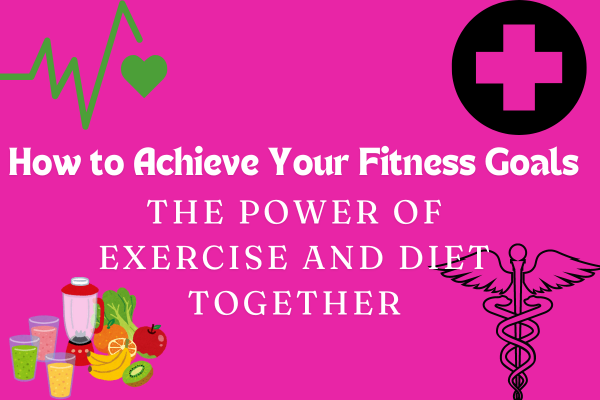Anyone trying to get healthier, reduce weight, or get more physically fit needs to understand the relationship between exercise and diet. To assist you in reaching your fitness and health objectives, this guide will examine the interactions between these two factors and offer you helpful advice and thorough explanations
Table of Contents
Importance of Exercise and Diet
A healthy lifestyle is centred on diet and exercise. Even while they can each help you get healthier, using them together produces the best effects. Knowing how they work best together can help develop weight loss, muscle building, and general health methods that are more successful.

The Science Behind Exercise and Diet
How Exercise Affects Your Body
Your body benefits from exercise in many ways, including the burning of fat and calories, the development of muscle, and the improvement of cardiovascular health. Frequent exercise increases metabolism, elevates mood, and helps control hormones.
Key Benefits of Exercise:
- Calorie Burning: Exercise raises your energy expenditure, which aids in calorie burning and fat loss.
- Building Muscle: Strength training promotes the creation of new muscles, which raises the resting metabolic rate.
- Hormonal Balance: Insulin and cortisol, two hormones that are important for energy expenditure and fat storage, are regulated by exercise.
- Better Mood: Exercise causes the release of endorphins, which can make you feel better and less stressed.
How Diet Affects Your Body
Your body needs nutrition and energy to function, which are provided by diet. Your health, weight, and physical performance are all directly impacted by the type and quantity of food you eat.
Key Benefits of a Healthy Diet:
- Provision of Nutrients: Vital vitamins, minerals, and macronutrients from diet aid in the maintenance and repair of the body.
- Energy Source: The energy required for daily tasks and activity is derived from proteins, lipids, and carbohydrates.
- Weight control: Eating a balanced diet will help you control your caloric consumption and keep a healthy weight.
- Disease Prevention: Eating a healthy diet lowers the chance of developing long-term conditions like diabetes, heart disease, and obesity.
Related: Fitness and Weight Loss Tips
The Synergistic Relationship Between Exercise and Diet
Complementary Roles
Together, food and exercise have a synergistic effect that optimises health advantages. Exercise helps use and optimise the fuel and nutrients that a diet supplies for better body composition and function.
Enhancing Weight Loss
Establishing a calorie deficit with a combination of exercise and food is crucial for successful weight loss. While diet alone can lower caloric consumption, exercise also promotes fat loss and maintains muscle mass.
Building Muscle
A diet high in protein and strength training are essential for building muscle. Muscle growth is stimulated by exercise, and the building blocks for growth and repair are found in protein.
Improving Performance
To improve performance, athletes and fitness enthusiasts must concentrate on both nutrition and exercise. A healthy diet provides energy for exercise, promotes healing, and increases strength and endurance.
Detailed Tips for Balancing Exercise and Diet
1. Set Realistic Goals
Why It Matters:
You can monitor your progress and maintain motivation by setting reasonable goals. Expectations that are too high might cause demotivation and disappointment.
How to Implement:
- Evaluate where you are at now: Recognise your present eating and exercise patterns.
- Establish Specific Goals: Whether your objective is to lose weight, increase muscle, or perform better, make sure it is SMART—specific, measurable, achievable, relevant, and time-bound.
- Make a Strategy: Describe a well-balanced exercise and food regimen to help you reach your goals.
2. Understand Your Caloric Needs
Why It Matters:
Understanding your calorie requirements helps you make sure you’re getting the proper quantity of energy to support your goals and level of activity.
How to Implement:
- Determine Your Basal Metabolic Rate (BMR): You may find your BMR by using internet calculators.
- Adjust for exercise Level: To estimate overall calorie expenditure, take into account your level of daily exercise.
- Keep an eye on and modify: Keep a regular record of your intake and make adjustments in response to your progress and activity level changes.
3. Prioritize Protein Intake
Why It Matters:
Protein is essential for muscle repair and growth, especially after exercise.
How to Implement:
- Incorporate Protein into Every Meal: Try to get your protein from a range of sources, including dairy, legumes, lean meats, and plant-based sources.
- Post-Workout Nutrition: Eat a high-protein meal or snack within 30 minutes of working out to aid in mending.
- Track Intake: Make sure you’re getting enough protein by using an app or food journal.
4. Balance Macronutrients
Why It Matters:
For optimum health and performance, a balanced diet rich in carbs, proteins, and fats provide the energy and nutrients required.
How to Implement:
- Carbohydrates for Energy: Give complex carbohydrates like fruits, vegetables, and whole grains priority.
- Healthy Fats: Consume unsaturated fat-containing foods like avocados, nuts, seeds, and olive oil.
- Regular Meal Timing: To sustain energy levels, space out your consumption of macronutrients throughout the day.
5. Stay Hydrated
Why It Matters:
Hydration is vital for overall health, exercise performance, and recovery.
How to Implement:
- Track Fluid Intake: Try to drink eight glasses of water or more if you’re an active person each day.
- Electrolyte Balance: Drinks containing electrolytes can help replenish lost minerals during strenuous exercise.
- Hydration Schedule: Don’t limit your water intake to workouts; sip it all day long.
6. Plan Your Meals and Snacks

Why It Matters:
Meal planning helps you maintain a balanced diet and avoid unhealthy choices.
How to Implement:
- Weekly Meal Planning: Make a menu for the coming week that is balanced in terms of both meals and nutrients.
- Healthy Snacks: To stave off hunger in between meals, keep wholesome snacks like fruits, almonds, and yoghurt on hand.
- Prepare Ahead: To save time and make sure you keep to your schedule, prepare and portion meals ahead of time.
7. Listen to Your Body
Why It Matters:
Paying attention to your body’s signals can prevent overtraining, under-eating, and other issues.
How to Implement:
- Acknowledge Hunger and Fullness: To keep a positive relationship with food, eat when you’re hungry and quit when you’re satisfied.
- Rest and Recovery: To give your body time to heal, include rest days in your workout regimen.
- As necessary, adjust: Adapt your exercise and nutrition regimen to your body’s reaction.
8. Seek Professional Guidance
Why It Matters:
Experts can provide personalized advice and support to help you achieve your goals safely and effectively.
How to Implement:
- Speak with a Dietitian: Receive individualised nutrition guidance based on your objectives and needs.
- Employ a Personal Trainer: Consult a trainer to develop a personalised workout schedule and guarantee correct form.
- Participate in Support Groups: For accountability and inspiration, interact with communities or groups who share your objectives.
Common Myths About Exercise and Diet
1. Losing Weight with Exercise Alone Is Enough
Reality:
Exercise is important, but for weight loss to be successful, it must be accompanied with a balanced diet. It is more efficient and long-lasting to create a calorie deficit by food and exercise combined.
2. You Can Eat Anything If You Exercise
Reality:
You are still not entitled to indulge in junk food just because you exercise. For general health, performance, and weight management, the quality of nutrition is important.
3. Carbs Are Bad for You
Reality:
Energy from carbohydrates is vital, particularly for those who engage in physical activity. The secret is to select complex carbohydrates and to balance them with fats and proteins.
4. You Must Eat Immediately After Working Out
Reality:
Nutrition after exercise is crucial, but when to do it depends on your entire diet and routine. After exercise, consuming carbohydrates and protein within a few hours can help with recuperation.

Conclusion
The relationship between exercise and diet is multifaceted and crucial for achieving optimal health, fitness, and performance. You can optimise the advantages of both by realising how they complement one another and putting balanced tactics into practice. Always remember to plan your meals, remain hydrated, prioritise protein, recognise your calorie needs, listen to your body, and seek professional help. You should also prioritise setting realistic objectives and balancing your macronutrients. Realising common misconceptions and concentrating on methods supported by science will enable you to attain long-lasting outcomes.
You’ll be well on your way to a healthier, fitter, and more energetic life if you embrace the synergy of exercise and diet.

